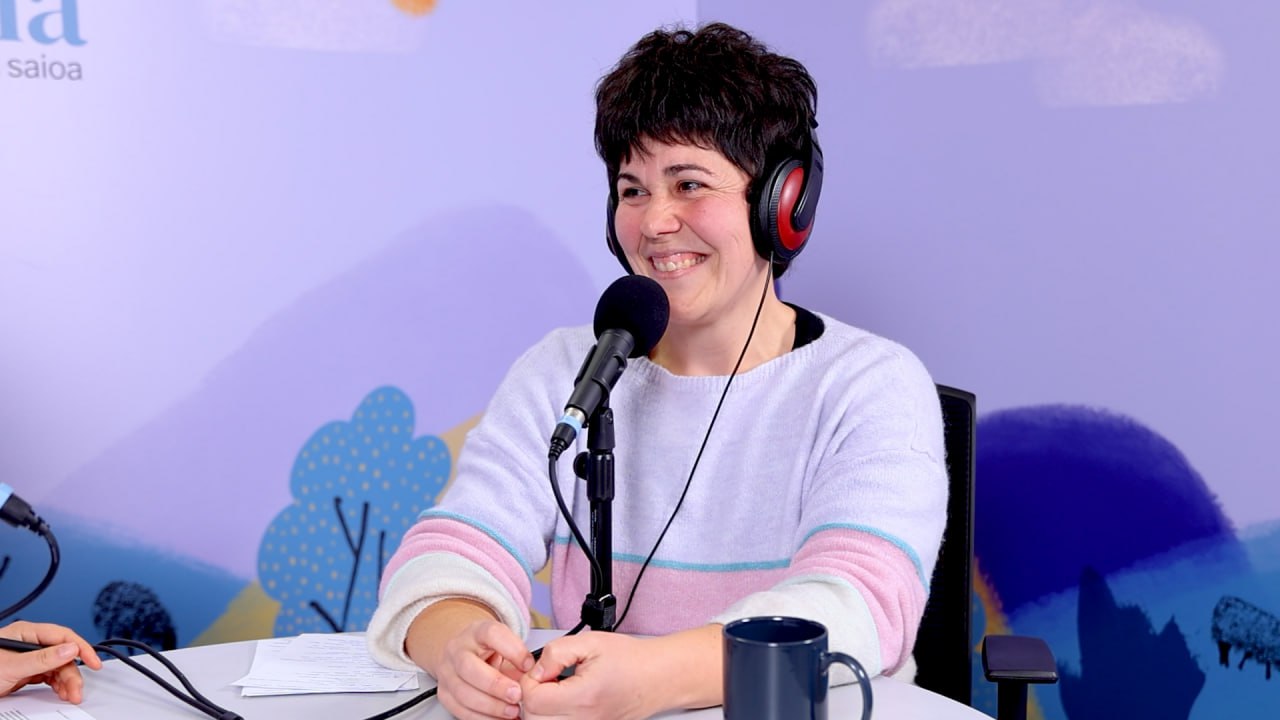
- On the occasion of Working Women's Day, Eli Pagola addressed the spectators of Egonarria the question "What comes to mind when we hear the word working woman?". Does the image of the peasant woman come to us? Interview with Alazne Intxauspe, an ecologist and member of the EHNE trade union and the Etxaldeko Emakumeak group. Intxauspe has evidenced that women have carried out many invisible and unrecognized cultural works necessary to carry out the dwelling. And it has been women who have maintained a model of agroecology that today is valued, respectful of the earth and all living beings. It has also explained its relationship with the feminist movement: feminism has brought to the streets the motto "life in the center" and the daily work of peasant women is precisely the maintenance of life, land, animals and people working food.

Here you can see the full fluid dialogue:
We have transcribed several passages:
Eli Pagola. Taking into account Working Women's Day: Before being a farmer, she worked in other jobs and later decided to move to the farmhouse to dedicate herself to horticulture. The ways of working are very different in terms of conditions, hours, responsibilities. How do you understand the work?
Alazne Intxauspe. I work with my partner and mix housing and work. And with everything we've known historically, it's hard to name what it is to work and what it is not, if it's not done consciously. In order to carry out our activities, it has been necessary to do many jobs, which in most cases have been carried out by women and which have not been considered jobs either. I consider that the job is to sow carrots or slimming or removing herbs, but also that in daily life it is work to relate to our clients, and that it is also work to put some of these carrots in a salad on our table plate. There's a lot of work to be able to move the cottage forward.
Eli Pagola. What happens is that when a third child was born in a household, the grandfather of the house cried with sorrow because he had not yet been born. In this sense, what is being a woman or being born a woman in a household?
Alazne Intxauspe. I think this is a social construction. There has been a sexual division of labor, which has given rise to an imaginary in which man has been more associated with the public sphere, with visibility and value, also economically, the tractor, livestock, attendance at joints and aba. And the woman has been more associated with what is called reproductive work, which has no visibility, which has not been given value, that is, caring for the children, eating at the house table, having the house in order... things that have not been considered or work, but that at the same time have been necessary for keeping the house.
I believe that women, in addition to the works that have historically corresponded to them in this social construction, have also carried out work on exploitation. And these exploitation tasks have also been performed on many occasions as "help," without economic recognition, of course, but without considering work, as "help." Now, when you have had to do the other way around, I mean, when there has been a lot of work at home because you have to take care of the children, or that parity has not been given. I would therefore say that women have suffered an added workload, without recognition.
From here we can also understand that social security discharge has historically been one of the main demands of peasant women. At least to have labor rights. And at the same time, ask men to participate in care and that it's everybody's duty.
I don't like to talk about "woman," as one, because there are very diverse women. But I believe that we must give social recognition to all the work done by the peasant woman, who has not been seen or put into value.
Nowadays, other forms of work, more collective, have been developed that may allow a new organization to overcome some of these gender roles. But I also believe that we have to do conscious work and often inertia, urgency prevails over the important. Still, as a society, we have the challenge.

Eli Pagola. What are the challenges and needs of Etxaldeko Emakumeak?
Alazne Intxauspe. I would like to stress that we are not creating anything or just us. We are a consequence of all the work and struggle of previous women, other previous meetings for the acquisition of rights and all that collective history is currently the result of Etxaldeko Emakumeak.
Today our greatest demand is not that of social security, but other demands that for us are the same as we have seen in women before: for example, as food producers, recognizing our role and our role. Another recognition to be given to peasant women is that of the “agroecology” or model of housing that is now mentioned in many spaces. Women have worked hard to maintain this model. In our childhood, agriculture back home, our local healthy food, the strengthening of our local economies, the establishment of a new way of relating… Recognizing and valuing the work of women in relation to other types of agriculture is one of our main demands.
Another historical claim is care. Now, fortunately, this claim has been concentrated, but rural women have historically demanded such recognition, men's awareness, participation in domestic tasks. To value care, to focus care, to create other collective surveillance systems, which we are now seeing at the hands of the feminist movement… All this has been our demand.
Eli Pagola. Is there enough work in every hamlet and how do you organize to meet at Etxaldeko Emakumeak?
Alazne Intxauspe. It is important for us to meet. The cottage is known to be isolated, in each place there is a lot of work and little time for other things... For us the auzolans are important to bring together the baserritarras women (of all kinds of "women", not only women, but also other diversities). To get together and start, to help another, for example cleaning the greenhouse or painting the chicken cooker -- then it's usually a good meeting point, with a meal, but it's also a way of working the training, or talking about a concrete need for one -- that's our way of meeting.
Eli Pagola. During the general feminist strike on 30 November, peasant women played a prominent role in their demands. What work are they doing with the feminist movement?
Alazne Intxauspe. We want to impregnate food sovereignty and feminism with food sovereignty. When we came to November 30, when the centralization of the care system or the realization of a public and community care system was proposed, we saw our contribution: when we talk about caring for people, we first have to talk about caring for one's own life. They are not just people, they are animals, they are our seeds, our territories, our land, etc. That is what we do every day, so the connection is clear.
To organize a care system, it is necessary to organize a feeding system. There we also saw clearly the connection, because we work in the production of healthy foods. The table of demands for strike included the protection and promotion of agroecology. This recognition has been important to us.
But work with the feminist movement didn't start in November last year. Alliances are an important point for us, because we are not going anywhere to drive transformation. In 2015, the Women’s World March passed through Euskal Herria, where seeds were an important element: we made the seed bank and approached the feminist movement, and from there we will continue working continuously.

Eli Pagola. We often turn to dichotomies: urban or rural, feminist or peasant... from the workers' perspective, what is it special to have a profession so linked to land?
Alazne Intxauspe. I believe that interconnection with the environment, the way life itself is understood, is important. And that's why we got together really well with the feminist movement. Because our profession necessarily puts life at the center. We do not want to subordinate nature to us, we see this interconnection perfectly in our daily lives: we need coexistence for the benefit of all. That is a key point of our profession. I am referring, of course, to a certain crop model: the one related to land, the agriculture that wants to create healthy food, an agriculture that seeks not to put capital in the centre but to maintain life or life. A respectful agriculture, both with people and with the environment and so on.
Eli Pagola. Leire Milikua published the book "Lur gainean itzal azpian", which addresses the difficulties of political participation of baserritarras women.
Alazne Intxauspe. It's a consequence of social construction. We have been told that ours is a private area and we have to make an effort against it. Fighting care, the need to always be to others, without schedules, etc., is another effort, and it is not just taking time, often it is key what we think and the mental load that brings us. You also have to make an effort to feel that you are able to speak, that you are legitimated -- that doesn't help in political participation, you have to deal with many refractories.
Less so than the spaces in which work has been done intensely and which have always existed have been spaces of meeting, support, strength… The local markets have been spaces of meeting and empowerment of women. For example, in the Etxaldeko Emakumeak group, when one has to intervene in a public hearing, we have worked the speech between several. In this empowerment we see some progress.
If we want to look at the law, in 2015 the Agricultural Women’s Statute was unanimously adopted in the Basque Parliament, and one of its sections is to strengthen women’s political participation in agricultural organisations and associations. At present, 40 per cent of the delegations of these associations must be women by law, in order to be eligible: otherwise, this association will not receive a subsidy. With this we have two aspects: on the one hand, it is true that women can occupy these spaces, but on the other hand, if the hegemonic model of virility is not questioned, I believe that in order to make a real transformation or real effective participation it is a little torn apart, some more steps must be taken in mentality, etc., so that this participation is really effective.